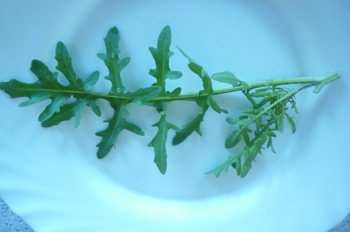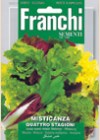 |
|
| > Welcome > Health Reporter > Disease Busting Bitter Tastes disappearing from Vegetables and Fruits
|
|
|
Plant breeders are following instructions from their food industry bosses to get rid of plant compounds which improve health.1 Why? Simply because these beneficial plant compounds taste bitter. Many people have a lingering idea that any bitter tasting substance is poisonous, and so avoid any bitter tastes. Do you? But in fact scientists studying human taste and health have found that foods that taste a little bitter, are beneficial to human health, and do no harm. 2 Bitter Tastes can mean Cancer Prevention and MoreYou may have heard about vegetables in the cruciferous family, for instance broccoli, having anti-cancer properties. The anti-cancer effect is due to at least one bitter compound called glucosinolates. Tasting a small quantity of bitterness daily, and gradually getting used to bitter tastes in the mouth, can kick start sluggish livers, sluggish gall bladders, stomachs which have become low acid in response to sluggish livers, and encourage tired pancreases to wake up and start responding again.3 Bitter tastes also appear to balance blood sugar and so reduce the risk for Type 2 diabetes; bitter tastes can improve blood pressure; some bitter tastes have the ability to reduce the risk for cancers, and help during cancer therapy;4 and perhaps most welcome of all to millions of people - tasting bitter foods, drinks or tonics appears to have the ability to satisfy the appetite and so reduce calorie intake by up to 30% over about three months, without even trying!5 For human beings, tasting bitterness in the mouth, immediately stimulates the digestive system, then the large vagal nerve running from the stomach to the brain starts firing off messages to special receptors for bitterness all over the body. 6 These receptors (called T2R's) are being studied intensively because scientists are trying to understand why the taste of bitterness can begin healing reactions in the human body. 7 Sadly, most of us have very weak receptors for bitterness these days. The receptors are still there, but don’t get too much work. 8 We miss out on these bountiful benefits of bitterness because.....well why? And if God intended us to be eating bitter foods, where is all this bitterness hiding? Bitter Tastes Bred out of Fruits and VegetablesAs we read above, plant breeders, working to the demands of the food industry, are working hard and long to get rid of bitter flavours. Yes. This is true. The bitter compounds which could bring healing and health to billions are being bred out little by little.9 In fact many of the bitter tastes being studied for health have been treated by the food industry and consumers as bitter waste, and are thrown away! Have you noticed the world is going a little upside down these days - good things are called evil, and evil things are called good?10 The truth is that most people want to eat sweet tasting fruits, sweet tasting vegetables, and sweet tasting grains. So there has been focussed breeding of sweeter tasting food in the last 100 years, but to find the original variety of any plant, we would need to wind time back hundreds of years, when the best tasting plant would be grown to seed stage, and the seeds saved for the next growing season. Bitter Tasting Food in Bible TimesYou might have a question rolling around your brain: “Why don’t we see evidence in the Bible about the goodness of bitter tasting foods?” Simply because all the food throughout the times of the Bible was somewhat bitter. The bread for instance in the times of Jesus, for ordinary people, was made from barley, with strong tasting millets and barley yeast. Most people today would find the bread to be heavy, dense and distasteful.11 Do you disagree? Well, just ask yourself why so many people peel a cucumber without a second thought? To get rid of bitterness! And what about people who buy organic carrots and then peel them? To get rid of bitterness. Or how about an apple? I encourage you to peel an apple, then just eat the peel and try to detect some bitterness. Yes, the bitterness is there, but far, far less than 50-100 years ago. Heritage Food Crops Research Trust - studying Fruits and Vegetables in NZA friend, Mark Christensen, happened upon an old overgrown apple tree on a farm years ago now, and this chance happening set him on his life's work of discovering the nutrition in heritage or heirloom varieties of plant food. This apple, named Monty's Surprise, has been tested in France against other apples and thus far has tested for higher compounds of phenolic compounds (including bitter compounds) than any other apple in the world. This is why the Monty Surprise apple has been hailed as the Anti Cancer Apple, and in New Zealand and Australia you can order a tree at garden centres.12 I must add here, that I believe there is a huge difference between a naturally bitter variety of plant grown well in good soil, and a plant which is bitter because it is grown poorly in degraded soil. I used to grow lots of disappointing vegetables – because I had not yet learned that the quality of the vegetable depends on how healthy the soil is! The nasty tasting, poorly grown vegetable will be low in nutrients. But the good quality vegetable, from a variety with naturally containing bitterness is strangely tempting - once you have attuned your mind to a little bitterness being a good thing in life. If you grow a little of your own food, you will be able to eat a wider range of bitter compounds from varieties labelled "Heirloom", "Heritage", or "Open Pollinated". Varieties with F1 are not older varieties. If you are keen to grow something with bitter flavours, in your garden, in pots or as microgreens, a traidtional Italian Mesclun mix is easy and delicious.
Traditional Vegetable Seeds with Bitter Chicories and more - FranchiMany years ago, while in the north of France, I stumbled into a little hardware shop and spied a rack of colourful seed packets. We splashed out and bought a packet of seeds, hoping the word "lattuga" meant lettuce. (It does). Ever since I have sought out and bought Franchi Seeds. The Franchi family were selling their seeds in Italy when Captain Cook was on his voyage of discovery, and the same family still owns the business. I like Franchi's dedication to quality and traditional varieties but even more we enjoy the way the seeds grow into plants which adapt to different climates and soils. I have grown vegetable plants from Franchi seeds in the Highlands of Scotland (UK), in New Zealand and in Australia. Every single seed variety from Franchi has grown magnificently for me. I trust their seed, but I'm not advertising, just passing on my last 15 years experience of growing Franchi seeds. Or you could start with Wild Rocket seeds. Rocket is one leafy green vegetable which has been left alone by the breeders until quite recently, so is still quite original. The image at the top of this article is a leaf of Wild Rocket from our Australian garden. Apple Peel has some Bitter Taste - Hurrah!Perhaps you are lucky enough to live somewhere with an old apple tree - make sure to use all the apple, including the peel. Dried apple peels, ground into a powder, are an interesting way to add a little bittersweet taste to your soups, stews and healthier sweet treats. I find a warm, dark, dry spot. Lay the apples on a tray in a single layer then check on them daily until really dry. Then, I grind the dried peel and add a spoonful of the apple peel powder to all sorts of dishes including soups, stews, healthier sweet treats. Very good when lemons are in short supply! If you're asking yourself, "Hmmm what can I do about all this?" I encourage you to eat just a little bit more raw vegetable every day. A little bit more vegetable = a little bit more bitter constituent and that is g-o-o-d! Doesn't matter what vegetable! If you have green leafy vegetables, that's great! If you have raw carrot, perfect! Raw beetroot? Go for it! Start today and eat a little bit more every day. It's not rocket science, just a litte daily choice! Next time, I'll introduce you to the humble dandelion and maybe a few other green friends! Next Time: How to Eat a Dandelion References
Posted: Sun 20 May 2018 |
|
|

